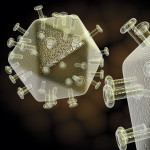A Phase III clinical trial of Gilead Science’s once-daily experimental integrase inhibitor elvitegravir is now open and enrolling patients, according to a press release issued yesterday by the company. The company also announced plans to study a novel boosting agent that can potentially be used as an alternative to Abbott Laboratories’ expensive and side effect-prone Norvir (ritonavir).
In order for HIV to successfully take over a CD4 cell’s machinery so that it can produce new viruses, HIV’s RNA must be converted into DNA by the reverse transcriptase enzyme (nucleoside reverse transcriptase inhibitors—NRTIs—can block this process). After the reverse transcription of RNA into DNA is complete, HIV’s DNA must then be incorporated into the CD4 cell’s DNA. This is known as integration. As their name implies, integrase inhibitors work by blocking this process.
Elvitegravir, also known as GS-9137 and JTK 303, is the second integrase inhibitor to be studied in large-scale clinical trials and to show promise for HIV-positive people with drug-resistant virus and limited treatment options. Gilead is hoping to show that elvitegravir, given once daily with a low dose of Norvir, is no less effective than Merck’s twice-daily integrase inhibitor Isentress (raltegravir), which was approved by the U.S. Food and Drug Administration in October 2007.
The current study will enroll 700 treatment-experienced HIV-positive patients at about 125 sites in the United States and Puerto Rico. Participants will receive either once-daily elvitegravir or twice-daily raltegravir and, based on the results of drug-resistance and tropism testing, a Norvir-boosted protease inhibitor with an NRTI, Intelence (etravirine), Selzentry (maraviroc) or Fuzeon (enfuvirtide).
A second Phase III study with a similar design will be initiated later this year in Europe, Canada and Australia.
Gilead also announced that it is developing its own compound, dubbed GS 9350, that may be used as an alternative to Norvir to boost the blood levels and effectiveness of other antiretrovirals. If GS 9350 proves to be a safe and effective alternative to ritonavir for boosting purposes, Gilead plans to coformulate the drug with its other HIV drugs, including elvitegravir, Viread (tenofovir), Emtriva (emtricitabine) and Truvada (tenofovir/emtricitabine).
More information about the U.S. elvitegravir Phase III study is available on the National Institutes of Health’s ClinicalTrials.gov website. Click here for study details.
Advertisement
Advertisement
Advertisement






Comments
Comments